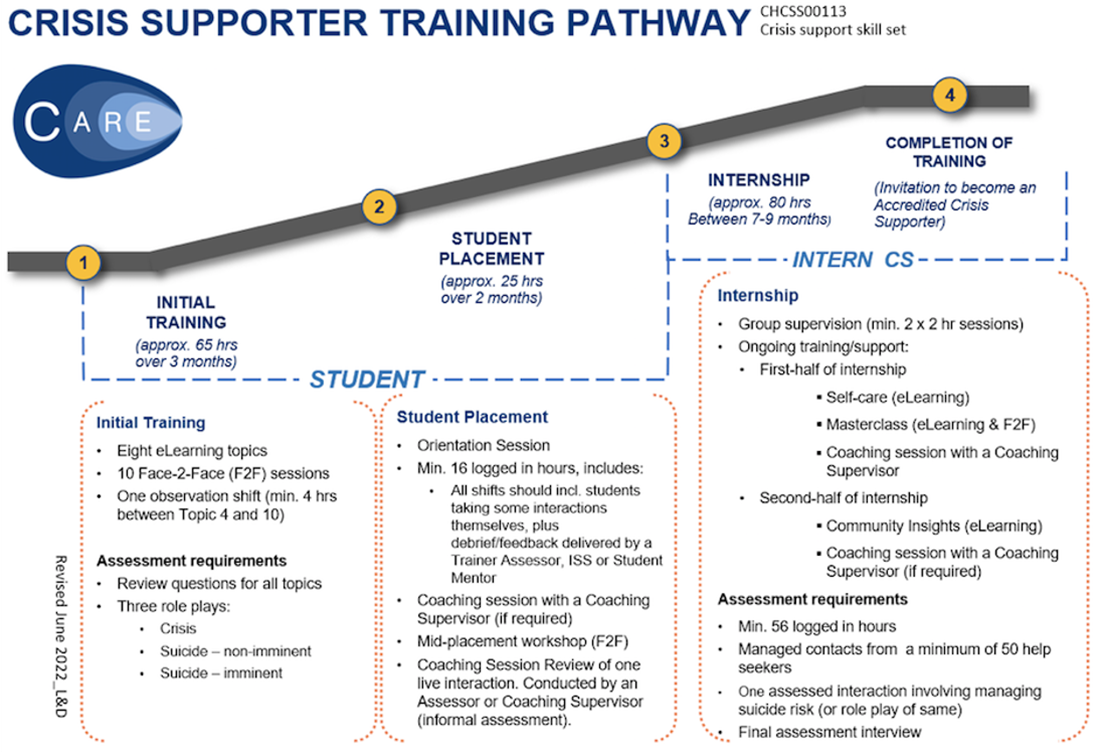Crisis Supporter Training
Crisis Supporter Workplace Training is a nationally accredited workplace training program for members of the general public to learn the skills required to become Lifeline Crisis Supporters.
Lifeline’s Crisis Supporters provide support to people in Australia who are having difficulty coping and may be at risk of suicide.
At Lifeline Ballarat we have an amazing team of volunteer Crisis Supporters (CSs). We are serious about providing the best training and ongoing support to our CSs. Lifeline Ballarat CSs receive comprehensive initial training, which is supplemented by tailored PD sessions that enable the CSs to consolidate their knowledge and skills, as well as provide opportunities to enhance their practice.
Why do people volunteer to become Crisis Supporters?
To read more about what Lifeline Ballarat volunteers say about being a Crisis Supporter, click here.
Anyone is eligible to apply, provided the following criteria are met:
Click here to view the Lifeline Crisis Supporter Position Description.
The Crisis Supporter Workplace Training (CSWT) has been created to equip students with the necessary skills and knowledge needed to undertake the Crisis Supporter role.
The CSWT training program is divided into three Stages:

Training is delivered on behalf of Lifeline Australia RTO 88036 (see our Compliance Manual here), under the Australian Skills Quality Authority (ASQA). Lifeline Australia contracts Lifeline Centres to deliver nationally recognised training and assessment services in accordance with the Vocational Education and Training (VET) Quality Framework.
By undertaking Lifeline’s Crisis Supporter Workplace Training (CSWT) program, students will not only be trained as a Lifeline Crisis Support Worker, they will obtain a nationally recognised qualification for the CHCSS00113 Crisis Support Skill Set upon completing the required assessments successfully and achieving competency for each of the following units:
To maintain your accreditation as a telephone crisis supporter it's important to remember that you must:
The cost of providing training across the three stages of the CSWT is significant and Lifeline recognises the value of the time commitment volunteers provide to Lifeline and to help seekers, and therefore provides the training at a substantially subsidised cost. The co-contribution fee for undertaking the training is $550 (inclusive of GST). By prior arrangement, a payment schedule may be agreed.
Scholarships are available until June 30, 2024. These scholarships reduce the co-contribution fee from $550 to $170.
Lifeline Ballarat Scholarships are offered to people interested in becoming an accredited Crisis Supporter who:
• Agree to complete the CSWT program (12 months)
• Commit to volunteering for 2 years as an accredited Crisis Support Worker - one shift per week.
If you'd like to be considered for a scholarship, please tick the Scholarship box when filling out the CSWT application form (see next tab).
There will be four Crisis Supporter intakes in 2026.
January/April/July/September
The next volunteer information sessions will be held online:
Tuesday October 21, 2025
Session 1 - 2pm (click on the Zoom link below to register for this session)
https://us06web.zoom.us/meeting/register/8NcgbLilRByE5_f0zHNzIA
Session 2 - 6pm (click on the Zoom link below to register for this session)
https://us06web.zoom.us/meeting/register/tZAsc-mvqT4iHdBZorVkXiGPzzAipm0fLgzH
If you have any questions about the application process, please email Lifeline Ballarat:
Lifelinevolunteerenquiries@vt.uniting.org
or telephone:
9051 7471
To become a telephone volunteer crisis supporter for Lifeline's 24-hour Crisis Support service - 13 11 14 - you'll need to undertake extensive training, make a commitment to shifts, and meet further selection criteria. This is to ensure you'll be confident, skilled, and able to provide support to Lifeline's callers in their time of emotional distress and crisis. This is a very rewarding volunteer opportunity.
No, the training provided to our volunteer Crisis Supporters will ensure you are qualified to offer a high standard of crisis support that keeps people safe.
Yes, all volunteer roles require a National Police History Check and relevant state Working with Children Check. The Police Check is at no cost to the volunteer.
We find most people who volunteer with Lifeline as a Crisis Supporter find it very rewarding, knowing they are contributing to saving lives. Most of our volunteers contribute to the Lifeline community for years. We ask our volunteer Crisis Supporters to commit to a minimum of 4 hours per fortnight, for a minimum of 2 years.